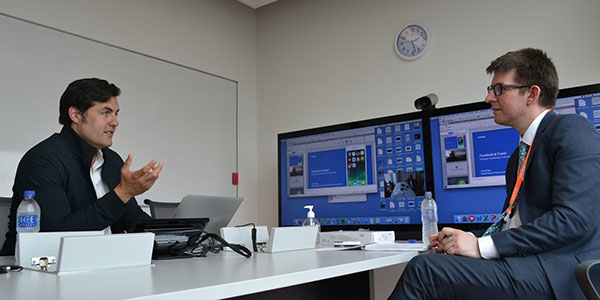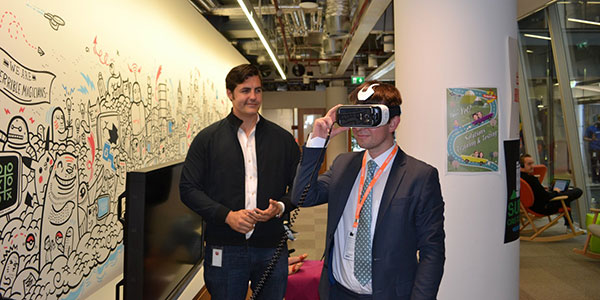
Ahead of his keynote address at Future Travel Experience Global 2015, which will take place in Las Vegas from 9th-11th September, Facebook’s Head of Travel, Lee McCabe, welcomed Future Travel Experience to the Facebook offices in London, where he provided us with a preview of what he has in store for delegates next month.
Smartphones, apps and business opportunities
“We now have a symbiotic relationship with our smartphones, and for business it just creates a tonne of opportunity,” McCabe explained. Among the myriad organisations in a position to exploit these opportunities are airports and airlines, but he said that bar one or two examples, most are playing catch-up, especially when it comes to apps.
“One of the questions we get asked a lot by companies is: ‘Should we develop an app or mobile web?’ So if we look at the big companies in the US for an indication – the majority of website visits are mobile-only or multi-platform. If you look at Amazon and eBay and what they’re using, it’s apps, so apps are dominant. The companies who get it are developing good apps that are working well.”
While “any travel company should be racing to develop the best app possible and then get it landed as fast as possible”, the problem is that most airlines and airports are lagging behind other industries, he explained.
“I haven’t seen any airports yet that are doing a good job with that. I think travel is playing catch-up. If you look at all the travel companies, I think the start-ups are doing the best job, I think the OTAs (online travel aggregators) are then following. I think airlines and hotels are playing catch-up, and I put airports behind that.” In his keynote address in Las Vegas, McCabe will offer insight on what airports and airlines should be focusing on in order to improve their performance in this space in the months and years ahead.
Focus on doing one thing well
McCabe did give away one valuable tip: focus on doing one thing well, instead of doing multiple things averagely. “Uber is a good example, it’s a good experience,” he said. “I open Uber, it gets me a taxi, that’s it. Two clicks, a taxi is on its way, it works well. Other companies like Skyscanner and Flightsearch, two clicks and it does one thing well. So I think the companies that will win will have to do one thing well, rather than have several different apps or one app trying to do 10 different things.”
McCabe went as far as to say “I haven’t seen an airport app that offers a great experience” even though “there’s so much more you can do with apps”. “I don’t think they’re connecting well. There’s definitely not personalisation there. I don’t think the context is there, or the leveraging of signals,” he added. He suggested that airports should view their app more as a platform, which provides the vital flight information and services, but which can also be enhanced and developed by third parties; another point that McCabe will build upon in his presentation at FTE Global.
Virtual reality creates new opportunities

Facebook-owned Oculus Rift, which will be launched in early 2016, provides an example of how a platform model provides widespread benefits. Hinting at its potential use cases in the travel sector, McCabe explained: “I can see someone checking out the plane before they book – put Oculus on and look around the cabin and get a feel for where my seat is,” he explained. “For hotels, I can check out the hotel room before I get there. Oculus is a platform, so as with any platform you launch it and developers get hold of it and you’ll see things emerge that we probably didn’t expect, and use cases emerge – I think that will happen pretty quickly.
“It’s one of those technologies, like the iPhone, where you saw the iPhone for the first time and it was just 10 times better than what we had before – it was incredible. The first time you use Oculus, it’s the same.” Some airlines, namely Qantas and Transavia, have already started to explore the potential of virtual reality technology, and McCabe clearly expects this to be just the beginning of a much wider trend.







